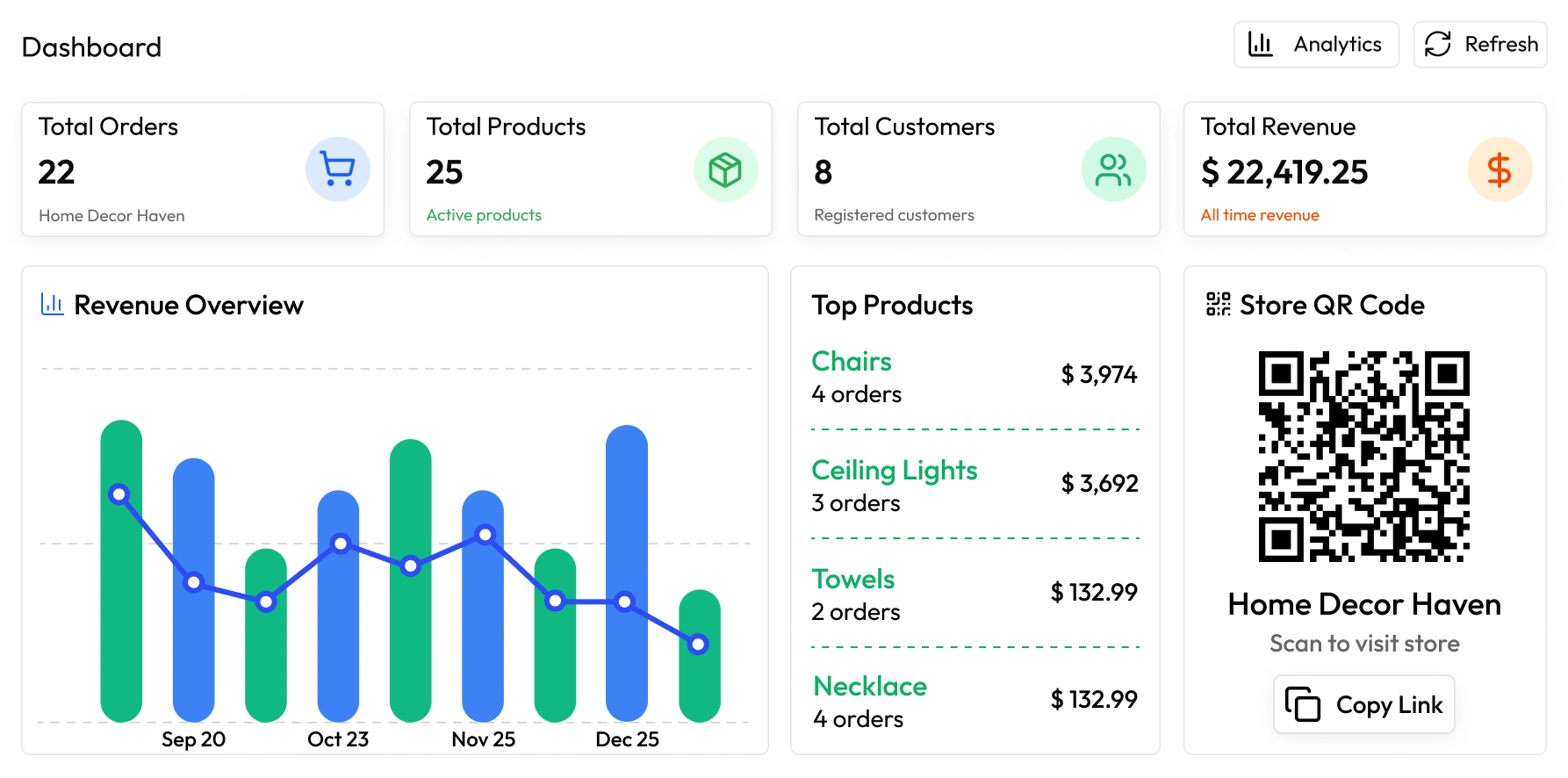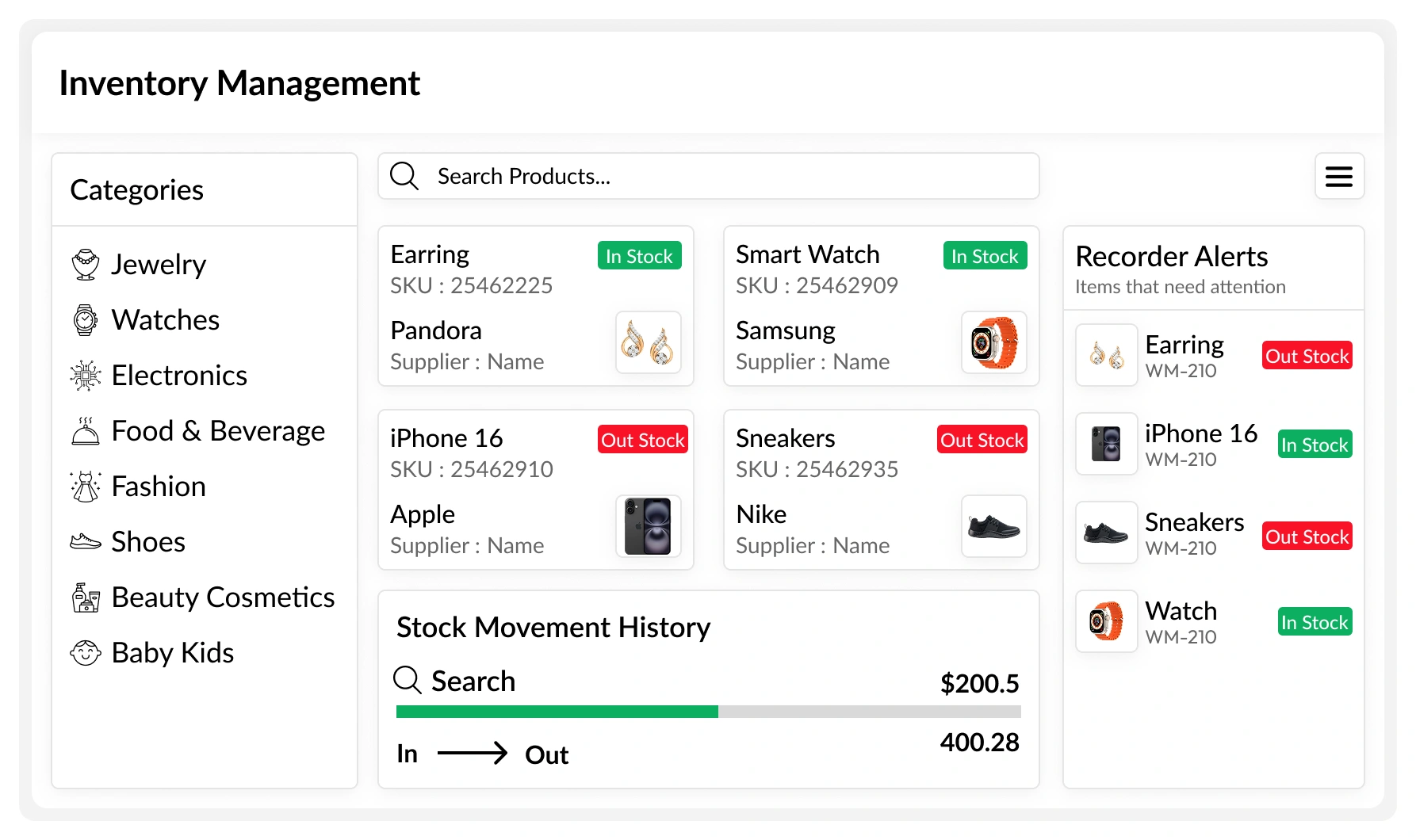What Is Store Management Software? Features & Benefits
Our store management software helps you run multi-stores, manage inventory, billing, and retail operations efficiently. With real-time stock tracking and sales analytics, it’s perfect for retailers seeking an all-in-one solution to boost store performance. In this blog, explore its key features, benefits, and how it streamlines retail and stock management for businesses of all sizes.
- Why Modern Store Management Software Is Essential for Retail Success
- The Retail Challenge: Why Retailers Struggle Today
- What Is Store Management Software?
- Why Retailers Need Store Management Software
- Key Features of Modern Retail Management Systems
- Types of Retail Store Software Solutions
- Stock Management Best Practices
- The Future of Retail Management Software
- Choosing the Right Store Management Software
- Successful Implementation Strategies
- Conclusion
- Frequently Asked Questions
Why Modern Store Management Software Is Essential for Retail Success
Modern retail faces unprecedented challenges. Picture this: customers walking into empty shelves because inventory wasn’t tracked properly, checkout lines stretching during peak hours due to manual billing systems, and store managers losing sleep over inconsistent operations across multiple locations. These aren’t isolated incidents; they’re daily realities for retailers operating without proper store management systems.
The retail crisis is real. Studies show that 43% of small businesses either don’t track inventory or use manual methods, leading to stockouts that cost retailers billions in lost sales annually. Manual processes create bottlenecks, human errors multiply costs, and without real-time visibility, even the best retail strategies fall apart.
This is where modern store management software transforms retail operations. As a comprehensive solution, advanced store management systems address these critical pain points by automating inventory management, streamlining billing processes, and providing real-time insights across single or multiple store locations.
Whether you’re a small business owner looking to revolutionize your operations or a store manager seeking better tools to improve workflow efficiency, this guide provides the insights you need to make informed decisions about retail store management software and how the right store management system can drive your retail success.
The Retail Challenge: Why Retailers Struggle Today
Before diving into solutions, let’s examine the specific challenges that keep retail owners awake at night:
- Inventory Nightmares: Without proper tracking systems, retailers face constant stock imbalances. Products run out unexpectedly, popular items remain understocked, while slow-movers tie up valuable shelf space and capital. The lack of real-time visibility means making purchasing decisions in the dark.
- Billing Bottlenecks: Manual cash registers and paper-based systems create long checkout queues, especially during peak hours. Tax calculations become error-prone, promotional discounts get applied incorrectly, and customer data remains scattered across different systems.
- Multi-Store Chaos: For retailers operating multiple locations, maintaining consistency becomes nearly impossible. Each store operates like an island—different pricing, varying stock levels, inconsistent customer service standards, and no unified view of business performance.
- Data Blind Spots: Without integrated reporting, retailers lose crucial insights. Which products drive profitability? What are the peak sales hours? Which locations perform best? These questions remain unanswered, making strategic planning guesswork rather than data-driven decision-making.
- Staff Management Struggles: Scheduling employees across different shifts and locations, tracking performance, managing payroll, and ensuring adequate coverage during busy periods becomes a complex juggling act without proper tools.
These challenges compound over time, creating a cascade of problems that directly impact customer satisfaction, operational efficiency, and ultimately, profitability.
What Is Store Management Software?
Store management software is a comprehensive digital solution designed to streamline and automate the complex operations that keep retail businesses running smoothly. Think of it as the central nervous system of your retail operation—connecting inventory, sales, staff, finances, and customer data into one unified platform.
Store Management in Simple Terms: At its core, store management encompasses everything required to run a successful retail business: selling products, managing inventory, coordinating staff, serving customers, and maintaining profitability. Modern solutions like Workdo Store management software transform these traditionally manual, error-prone processes into automated, efficient workflows.

Key Components of Modern Store Management
- Inventory Management: With Store management, retailers get real-time stock visibility from receipt to sale, automated reorder points, and demand forecasting to prevent stockouts and overstock situations.
- Sales Processing: Store management software automates invoicing, payments, and tax calculations through streamlined point-of-sale systems that handle multiple payment methods, apply promotions, and generate detailed receipts.
- Staff Coordination: Employee scheduling, performance tracking, payroll management, and communication tools that keep teams aligned and productive across all locations.
- Financial Oversight: Comprehensive reporting on sales trends, profit margins, expenses, and cash flow to support informed business decisions with real-time insights.
- Customer Relationship Management: Purchase history tracking, loyalty program management, and personalized service capabilities that build lasting customer relationships through integrated CRM tools.
The Digital Transformation of Retail
The contrast between traditional and digital store management is stark. Traditional methods rely on manual processes, paper records, and disconnected systems that create inefficiencies and errors. Digital solutions like Store management software automate routine tasks, provide real-time insights, and integrate all business functions into a cohesive system.
- Traditional Approach: Manual inventory counts, paper-based scheduling, separate cash registers and accounting systems, disconnected customer records, and time-consuming report generation.
- Digital Advantage: Automated inventory tracking with barcode scanning, integrated scheduling and payroll systems, unified point-of-sale and financial management, centralized customer databases, and real-time analytics and reporting.
Why Retailers Need Store Management Software
The retail landscape has evolved dramatically. Customer expectations are higher, competition is fiercer, and operational complexity has increased exponentially. Store management software isn’t just a nice-to-have anymore—it’s essential for survival and growth.
The Cost of Inefficiency
Poor inventory management alone costs retailers significantly. Stockouts result in immediate lost sales and disappointed customers who may turn to competitors. Conversely, overstock ties up capital and leads to markdowns that erode profit margins. Manual processes create labor inefficiencies, increase error rates, and limit scalability.
How Software Transforms Operations
Modern retail management systems address these challenges systematically:
- Inventory Management: With comprehensive stock management software, retailers get real-time stock visibility through barcode scanning that eliminates manual counting errors, automated reorder points that prevent stockouts, and live inventory updates that ensure accurate availability information for customers.
- Billing & Orders: Advanced store billing software automates invoicing, payments, and tax calculations with integrated payment processing that reduces checkout times, automatic tax compliance, and digital receipts that improve customer experience while reducing paper costs.
- Multi-store Support: Manage multiple branches from one dashboard with centralized retail management software that provides instant insights into sales performance, inventory levels, and operational metrics across all locations, enabling quick decision-making and proactive problem-solving.
- Scalable Growth: Cloud-based retail store management software grows with your business, supporting additional locations, increased transaction volumes, and expanded product catalogs without performance degradation.
Customer Experience Revolution
When internal operations run smoothly, customers immediately notice the difference. Products are consistently available, checkout is fast and accurate, staff have instant access to customer history and preferences, and service quality remains consistent across all touchpoints.
Key Features of Modern Retail Management Systems
A robust retail management system should seamlessly integrate essential business functions while providing the flexibility to adapt to unique business needs. Modern workdo’s store management software exemplifies this integration by offering comprehensive features that work together harmoniously.
Advanced Inventory & Stock Control
Modern store management begins with intelligent tracking. Advanced stock management tools equipped with barcode scanning capabilities allow instant stock updates, removing the guesswork from inventory management. Staff can quickly scan items for receiving, transfers, or sales, ensuring real-time accuracy across all locations. AI-powered automation further enhances efficiency with auto-reorder features that utilize machine learning algorithms to analyze sales patterns, seasonal trends, and lead times. This ensures that purchase orders are automatically triggered when stock reaches optimal reorder points—preventing both stockouts and overstock situations. In addition, real-time multi-location visibility provides a unified view of inventory across all stores, enabling smart stock allocation and inter-store transfers that optimize product availability and reduce carrying costs.

Comprehensive Billing & Order Management
A modern retail system offers complete flexibility in payments by supporting credit cards, debit cards, mobile payments, contactless transactions, and integrated online gateways—ensuring customers can pay using their preferred methods. Smart tax management automates tax calculations based on product categories, customer locations, and regional regulations, eliminating manual errors while ensuring full compliance. Retailers can also design and execute dynamic promotions such as seasonal discounts, customer-specific offers, and loyalty rewards that are automatically applied at checkout, simplifying campaign management and enhancing customer engagement.
Powerful Reporting & Analytics
Comprehensive reporting tools transform raw sales data into valuable business insights. Detailed sales intelligence reports identify best-selling products, reveal seasonal demand shifts, and track hourly sales trends, helping retailers refine operations. Real-time profitability analysis highlights the most profitable products and categories, empowering managers to make informed pricing and inventory decisions. Employee performance metrics further enhance business oversight by measuring individual and team productivity, identifying top performers, and highlighting training opportunities.
Multi-Store Management Excellence
Managing multiple branches becomes effortless with centralized control. From a single dashboard, retailers can oversee all store operations while maintaining flexibility for local market adjustments. Seamless transfer tools make it simple to move inventory between locations in response to demand, promotions, or seasonal shifts. Consistency is maintained across all outlets through unified policies, yet customization is still possible where local preferences demand it—ensuring operational harmony across the entire retail network.

Integrated Customer Relationship Management
Customer engagement is strengthened through integrated CRM features that build complete customer profiles, tracking purchase history, preferences, communication records, and loyalty program participation. These insights allow staff to deliver personalized service and tailored marketing campaigns. Loyalty management systems support point-based rewards, tier structures, birthday promotions, and exclusive offers that foster repeat business and long-term relationships. By leveraging these tools, retailers can deliver personalized shopping experiences that not only enhance satisfaction but also strengthen brand loyalty.
Types of Retail Store Software Solutions
Understanding different software categories helps retailers choose solutions that best match their specific needs, business size, and operational complexity.
Point of Sale (POS) and Billing Systems
Modern POS systems extend far beyond simple transaction processing. Advanced store billing software includes integrated inventory updates, customer data capture, promotional management, and comprehensive reporting—all within a user-friendly interface that minimizes training requirements.
Dedicated Inventory Management Systems
For businesses where inventory control is paramount, specialized systems offer advanced features like lot tracking, expiration date monitoring, automated vendor management, and sophisticated demand forecasting algorithms.
Comprehensive Store Manager Platforms
Modern store management software provides store managers with tools for staff scheduling, performance monitoring, task management, and team communication—everything needed to coordinate daily operations efficiently.
Stock Maintenance and Tracking Tools
Specialized tracking tools offer features like cycle counting, loss prevention monitoring, serial number tracking, and audit trail management for businesses requiring detailed inventory accountability.
Stock Management Best Practices
Effective stock management combines technology with proven processes and consistent execution. Success requires both the right store management software and the discipline to use it properly.
Why Stock Management Matters
Inventory represents a significant investment for most retailers. Optimal stock levels ensure product availability while minimizing carrying costs and obsolescence risks. Poor inventory control creates a cascade of problems: disappointed customers, cash flow constraints, and operational inefficiencies that compound over time.
Technology vs Process
While store management software automates many inventory tasks, successful stock management also requires sound processes: regular cycle counts, first-in-first-out rotation, supplier relationship management, and staff training on proper procedures.
Implementation Excellence
The most sophisticated software fails without proper implementation. Successful deployments require thorough planning, comprehensive staff training, careful data migration, and phased rollouts that allow for learning and adjustment.
The Future of Retail Management Software
Modern retail management systems represent the cutting edge of retail technology, incorporating emerging trends that will define the future of retail operations. As future-ready platforms, advanced store management software has already integrated these capabilities to keep retailers ahead of the curve.
AI-Powered Intelligence
Machine learning algorithms analyze vast amounts of sales data, customer behavior patterns, and market trends to provide predictive insights. AI-powered demand forecasting in stock management tools helps retailers anticipate customer needs, optimize inventory levels, and maximize profitability through intelligent automation that learns from business patterns.
Cloud-First Architecture
Cloud-based systems eliminate the need for expensive on-premise infrastructure while providing automatic updates, enhanced security, and seamless scalability. Cloud-based retail management software ensures retailers always have access to the latest features and security enhancements, with remote access capabilities that keep you connected to your business from anywhere.
Omnichannel Integration
As the lines between online and offline retail continue to blur, comprehensive retail software provides seamless integration with e-commerce platforms like Shopify, WooCommerce, and Magento, ensuring consistent inventory visibility and customer experiences across all channels.
Mobile-Enabled Management
Today’s retail managers need access to critical business information anywhere, anytime. Mobile-first store manager software enables real-time decision-making, remote monitoring, and on-the-go management capabilities, empowering store managers to stay connected and responsive to business needs.
Choosing the Right Store Management Software
Selecting the optimal store management solution requires careful evaluation of current needs, future growth plans, and available resources.
Critical Evaluation Factors
- Total Cost of Ownership: Consider not just licensing fees but also implementation costs, training expenses, hardware requirements, and ongoing support needs
- Feature Alignment: Ensure the software addresses your specific pain points while providing room for growth and expansion
- Scalability Requirements: Choose solutions that can grow with your business, supporting additional locations, increased transaction volumes, and expanded product catalogs
- Integration Capabilities: Evaluate how well the software integrates with existing business systems and future technology investments
- Vendor Support: Assess the vendor’s implementation support, training programs, technical assistance, and long-term viability
Making the Right Choice
Modern store management software stands out by offering comprehensive functionality, proven scalability, seamless integrations, and exceptional support—all delivered through an intuitive interface that minimizes training requirements and maximizes user adoption.
Successful Implementation Strategies
The difference between software success and failure often lies in implementation quality rather than feature sets. Proper planning, preparation, and execution are critical for achieving desired outcomes.
Planning Excellence
Successful implementations begin with thorough planning: clearly defined objectives, realistic timelines, adequate resource allocation, and stakeholder buy-in at all levels.
Training Investment
User adoption depends heavily on training quality. Comprehensive training programs, hands-on practice sessions, and ongoing support ensure staff can leverage the software’s full potential.
Phased Deployment
Gradual rollouts reduce risk and allow for learning and adjustment. Start with core functions, gather user feedback, make necessary adjustments, and then expand to advanced features.
Conclusion
The retail industry has reached a turning point where manual processes and disconnected systems are no longer sustainable. From inventory chaos and billing bottlenecks to multi-store management nightmares, the challenges facing modern retailers demand sophisticated solutions.
Store management software isn’t just a technological upgrade—it’s a business transformation that touches every aspect of retail operations. With comprehensive retail management systems, retailers can automate inventory tracking, streamline billing processes, gain real-time insights across multiple locations, and deliver exceptional customer experiences that drive loyalty and growth.
The evidence is clear: retailers who embrace integrated store management solutions see improved efficiency, reduced errors, better customer satisfaction, and stronger profitability. As the retail landscape continues to evolve with AI-powered forecasting, cloud-based management, and omnichannel integration, the question isn’t whether to adopt retail store software, but how quickly you can implement it.
Explore advanced store management software to simplify your retail operations and discover how the right technology can transform your business from surviving to thriving in today’s competitive retail environment.
📌 Frequently Asked Questions (FAQs)
Reach Out to Us
Have questions or need assistance? We're here to help! Reach out to our team for support, inquiries, or feedback. Your needs are important to us, and we’re ready to assist you!


Need more help?
If you’re still uncertain or need professional guidance, don’t hesitate to contact us. You can contact us via email or submit a ticket with a description of your issue. Our team of experts is always available to help you with any questions. Rest assured that we’ll respond to your inquiry promptly.
Love what you see?
Do you like the quality of our products, themes, and applications, or perhaps the design of our website caught your eye? You can have similarly outstanding designs for your website or apps. Contact us, and we’ll bring your ideas to life.
